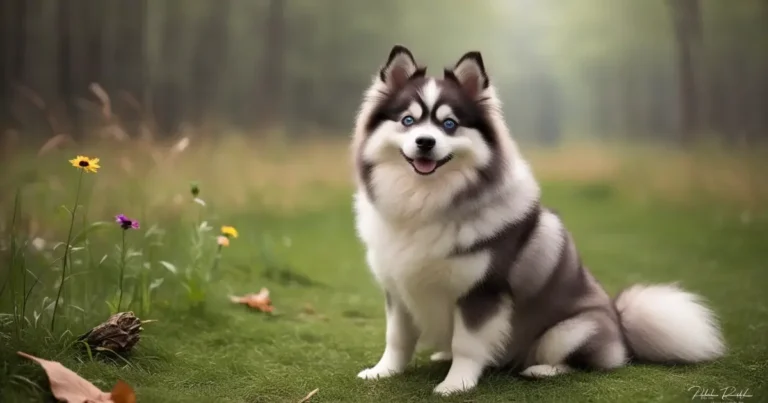What Are Pomsky Puppies? Ultimate Guide

Pomsky puppies are a unique and adorable hybrid breed created by crossing a Siberian Husky and a Pomeranian. This mix combines the best traits of both breeds, resulting in dogs with a striking appearance and lively personality. These puppies have gained immense popularity due to their charming looks, playful nature, and compact size, making them an ideal choice for many dog lovers.
“Pomskies are captivating because they combine the majestic look of a Husky with the compact, cuddly charm of a Pomeranian,” I often tell people when they ask why this breed is so sought after. However, owning a Pomsky comes with responsibilities, which we’ll explore in this guide.
Table of Contents
Characteristics of Pomsky Puppies
When it comes to characteristics of Pomsky puppies, they are as varied as they are fascinating. Let’s dive into their physical traits, personality, and grooming needs.
Appearance and Size
Pomskies have a wolf-like appearance, making them stand out in any crowd. They inherit the thick double coat of a Husky and often come in a variety of colors and patterns, including black, white, gray, and tan. One of their most eye-catching features is their eyes, which can be blue, brown, or even multi-colored.
| Feature | Description |
| Size | Typically 10–15 inches tall |
| Weight | Around 20–30 pounds |
| Coat | Thick, fluffy, and requires maintenance |
| Eyes | Blue, brown, or multi-colored |
“Pomskies are not guaranteed to be small. Genetics play a big role, and some can be as large as a small Husky,” I often explain to people interested in this breed.
Temperament and Behavior
Pomsky puppies are playful, energetic, and intelligent. They inherit the friendliness of a Pomeranian and the adventurous spirit of a Husky. However, their high energy levels mean they need plenty of physical activity and mental stimulation.

These puppies are great for families with active lifestyles, but they can also be a bit stubborn at times. Early training and socialization are key to ensuring they grow into well-behaved companions.
“Training a Pomsky requires patience, but the reward is a loyal and loving pet,” is my go-to advice for new owners.
Grooming and Maintenance
Pomskies shed heavily due to their thick fur, especially during seasonal changes. Regular brushing is necessary to keep their coat healthy and reduce shedding. Failing to groom them properly can lead to matting and discomfort.
| Grooming Needs | Frequency |
| Brushing | At least 2–3 times a week |
| Bathing | Once a month or as needed |
| Nail trimming | Every few weeks |
“Pomskies are high-maintenance in grooming, but their beautiful coat is worth the effort,” I like to remind owners.
The Challenges of Owning a Pomsky
Owning a Pomsky puppy is not without its challenges. Here are the two biggest ones you need to consider.
Uncertain Size and Temperament
Pomskies inherit a mix of traits from both parent breeds, making their size and temperament unpredictable. While many assume they’ll look like miniature Huskies, that’s not always the case. Some Pomskies can grow larger than expected, and their personalities can range from docile to highly spirited.
“Buying a Pomsky with the hope it’ll stay small is a gamble. Genetics don’t always align with expectations,” I often share based on my observations.
Health Considerations
As a hybrid breed, Pomskies may face health issues that affect either Siberian Huskies or Pomeranians. These can include:
- Hip dysplasia
- Eye problems, like cataracts
- Dental issues due to their smaller mouths
To avoid potential health problems, it’s crucial to choose a responsible breeder who conducts health screenings or to adopt from a reputable shelter.
“Health should always come first when selecting a dog. Choose wisely to ensure a happy, healthy pet,” is one of my key recommendations.
Alternatives to Pomsky Puppies
If you’re drawn to Pomsky puppies but unsure about their unpredictability, consider these alternatives.
Miniature Husky-Like Breeds
Several breeds resemble Huskies but come with more predictable traits. Examples include:
| Breed | Size | Key Traits |
| Alaskan Klee Kai | 10–15 inches | Intelligent, active, and Husky-like |
| Finnish Lapphund | 16–21 inches | Friendly, adaptable, and fluffy |
| American Eskimo Dog | 15–19 inches | Playful, loyal, and great companions |
“These breeds offer the look of a small Husky without the unpredictability of a hybrid,” I suggest to those exploring their options.

Adopting from Rescues and Shelters
Adopting an adult Husky mix from a shelter can also be a great option. With adult dogs, you know their size and temperament, reducing surprises.
“Shelters are full of amazing dogs waiting for a second chance. Adoption is a win-win for you and the dog,” is advice I wholeheartedly believe in.
Tips for Prospective Pomsky Owners
If you’ve decided that a Pomsky puppy is the right fit for you, here are some essential tips to ensure a smooth journey.
Training and Socialization Needs
Start training your Pomsky early. Use positive reinforcement techniques to manage their strong-willed nature. Socialize them with other dogs and people to ensure they’re well-adjusted.
Exercise and Mental Stimulation
Pomskies are active dogs. Daily walks, play sessions, and interactive toys are essential to keep them happy and prevent destructive behavior.
“A bored Pomsky can quickly become a destructive one. Keep them busy with plenty of exercise,“ I always remind owners.
Cost and Breeder Ethics
Designer dogs like Pomskies can be expensive, but price doesn’t guarantee quality. Research breeders carefully to ensure they follow ethical practices. Better yet, consider adopting.
“Don’t let price dictate your choice. Focus on finding a healthy, ethically bred puppy or adopt,” is advice I always stand by.
Conclusion: Is a Pomsky the Right Dog for You?
Pomsky puppies are beautiful, playful, and full of personality. However, their unpredictability in size, temperament, and health means they’re not the perfect fit for everyone.
If you’re willing to invest time, energy, and love into raising one, they can be a wonderful addition to your family. For those seeking more predictability, consider exploring alternative breeds or adopting from a shelter.
“The right dog is one that suits your lifestyle and brings joy to your home. Whether it’s a Pomsky or another breed, make an informed choice,” is my parting advice.
FAQs
How do Pomskies compare to other mixed breed dogs?
Pomskies inherit traits from both Huskies and Pomeranians, making them unique among mixed breed dog traits. Unlike other hybrids, their size, temperament, and appearance vary significantly, which can be both a challenge and a charm for owners.
What are some common grooming challenges with Pomsky puppies?
The characteristics of Pomsky puppies include a thick double coat that sheds heavily. Frequent brushing is needed to manage shedding, especially during seasonal changes. Failing to groom regularly can lead to tangles and discomfort.
Are there better alternatives to Pomsky puppies for families with kids?
Families might consider alternatives to Pomsky puppies, like the Alaskan Klee Kai or Finnish Lapphund. These breeds offer similar looks with more predictable traits, making them excellent companions for homes with children.
What should I know about the pros and cons of owning a Pomsky?
The pros and cons of owning a Pomsky include their adorable appearance and energetic personality as positives. However, unpredictability in size and potential health issues can be drawbacks. Be prepared for training, grooming, and potential high costs.






